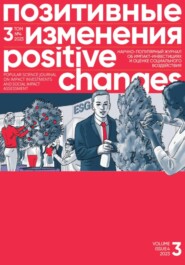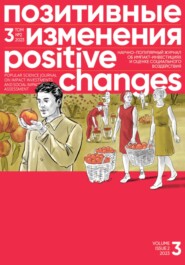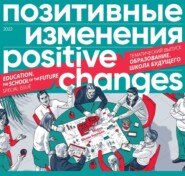По всем вопросам обращайтесь на: info@litportal.ru
(©) 2003-2024.
✖
Позитивные изменения. Том 2, №4 (2022). Positive changes. Volume 2, Issue 4 (2022)
Настройки чтения
Размер шрифта
Высота строк
Поля
So this is not the classic Russian story with the government in one corner and the NGOs and businesses in the other; we do everything together.
And what about the opposite? What hindered your development? What are the key deterrents?
Last year we barely had the time to produce and ship our wheelchairs; this year we have 300 units sitting in the warehouse. The deterrent here is not another domestic manufacturer appearing, but the government purchasing wheelchairs from China.
Is import substitution possible in your case?
As a matter of fact, we are import substitution. Our wheelchair is made of 65 % Russian parts. If, God forbid, China is closed down for political reasons or due to COVID, we will be the only company able to make our wheelchairs domestically.
It might take us a month, or two, or three, or even six months to substitute the remaining 35 %, but, unlike the Chinese wheelchairs, we are that import substitution.
They say the hardest part is getting started.
How did your project begin? Where did you look for investment at the start? Maybe someone advised you on how to launch a social enterprise?
I've been in business for a long time, so I have more ideas than the opportunities to implement them. I happily share my ideas so someone else can implement them.
It all started with wheelchair repairs. We were faced with the fact that there were no repair shops for electric wheelchairs. We got support from Vagit Alekperov's "Our Future” fund, which offered us an interest-free loan of 5 million rubles for five years. That's how we got our start.
Then, all of a sudden, I won the General Director Magazine award in 2013. The award was 100,000 dollars (3 million rubles back in the day). We used the money to build our first premises.
And where did you look for like-minded people and a team?
At first, I tried taking a sales manager and turning him or her into a «social-mind» worker. Turns out it doesn't work that way. So we changed direction. We started sourcing "social mind" workers from the Ark events (kayaking and adapted beaches in Kaliningrad Region). These were students fascinated by the project idea. Then we turned these «social-mind» worker into press secretaries, sales managers, and other employees. That's how we eventually built our team.
Who else supported you?
It seems to me that when you are into social entrepreneurship not for the money, but to solve a social problem, when your eyes are bright and you radiate the energy, the right people and money will automatically come into your life and to your project.
If suddenly they don't turn up, you will realize eventually, a year or two later, that you just weren't ready for the money at the time. You just weren't given the opportunity from above; and once you are ready morally and organizationally, the right people just come along.
Let me tell you the story of the EU Consul. We received a micro-grant of 100,000 euros, which was handed out by a local organization. We reported on our activities: the beaches, the workshops, the delivery of accessible environment, the social and tourist taxi, etc. After that, the EU Consul asked for a meeting. He came, he looked, and he said: "Why don't you apply to our grant competition?” I must have spent half an hour talking my way out of it. I told him: "We don't know how, we're not up to it." – "You still have to try it."
We ended up sending the application. Then solicited the head of the Department for Working with the Disabled of Kaliningrad Region government to work for us. We spent a year writing the grant application and won 750,000 euros at once, with which we began to develop the territory for the factory.
When you are into social entrepreneurship not for the money, but to solve a social problem, the right people and money will automatically come into your life and to your project.
Did you have any inspiring examples like people or organizations that helped you believe in yourself, in the success, in the technology?
Yes, we traveled a lot around Sweden, Germany, and Poland. I have an idol in Germany, an old man who is now 78 years old. He has a 16,000-square-meter factory with 400 employees. He has a cervical spine injury, just like me. And he makes the world's greatest catheters and urine receptacles. He also has a hotel there – two luxurious buildings sharing a glass roof. There are trees growing between the two buildings, and a beautiful restaurant in the courtyard. We borrowed the idea of cottages near the Observer factory from him, just added a kitchen.
You can live in this posh hotel or cottages for three days and be able to get into any room, even the swimming pool. You just ride up, push a 30-by-10-cm button on the wall, and you get into absolutely any room. It's not until day three that you realize you're living in a disguised rehabilitation center where wheelchair users brew beer right in the kitchen, where they cook their food. It's all very impressive.
I was sitting with him, talking. He has his own vineyard somewhere in the Canary Islands, and he was treating me to a Riesling. I told him: "Look, I have this idea to build a factory, but, man, I'm 45 years old.” He said: "Roma, 45 is the very age to get into an adventure called the factory. That's how I got in this trouble.
We traveled around Sweden a lot, too. It's "the land of victorious communism.” We had a lot to learn from them. The Swedish Minister of Welfare is now a friend of mine, and I asked him a question: "Look, I get it, we're coming to you because you are living in the future, but why are you coming to us?” He said: "Roma, it is easy to build communism when you have money growing on trees. But we are running out of money too, so we're very keen to see how you do it without the money.” That's also an interesting example.
We already started talking about the team, which is one of the components of success. Can you tell us a little more about your team of employees? What are the key roles of the participants? Are there development directors, operations directors? How many people do you have working for you?
It's not really hard. We are changing and growing so fast right now that our organizational structure cannot keep up with the changes. We now have four legal entities, each with its own tasks and activities, social organization, production, distribution.
We opened a sewing shop in January 2022. We make all the cushions, backrests, seat bases ourselves. It has its own supervisor, and I don't even go there. Everything just works perfectly. At the production site we have the chief engineer, who is also my partner, the head of production facility. We lured him from the Yantar plant. I do visit them and guide them from time to time. But generally my colleagues are handling the operations on their own anyway. There rehabilitation center is a separate entity. It is run by a girl who we poached from the Government of Kaliningrad Region. I am not worried about that side of operations at all. I make some strategic decisions, I attend the meetings, but basically this unit is almost entirely autonomous.
Honestly, we just did what we had to. When we got to the point where I physically could not handle all the workload myself, I had to delegate. What we are missing now is a sales director and a development director. We will grow up a little more, and they will appear.
When you realized that you had become a media and public personality, did the attention of the media and authorities appear? At what point did this happen?
I always found it important to speak in public, to share my ideas, to ignite people with them, etc. Then I broke my neck in 2004 and I experienced an insane lack of information. Just then the broadband Internet appeared, the first forums, and I started writing about what was happening to me. I already had a crowd of subscribers at the time, because for everyone it was a life-giving refreshment, information on how, where and why to go to rehab.
Next, when we organized "The Ark,” a public organization for the disabled, and started doing things, the organization gained reputation. The mayor and the governor knew they could trust the guys from the Ark. That is, we are the crazy organization that, for example, received a grant of 100,000 rubles, added 100,000 of our own, raised another 100,000 from the Kaliningrad residents, invested it all in a project and did something useful with that money. Active work started around 2013. With that reputation, it was easier to develop.
How did your life change after that?
It changed so much that I moved from working nine hours a day to 15.
Surely you had periods when it seemed that everything was a dead end, you couldn't get any further. What helped you in those moments?
I'm an optimist. I know it's going to work out. Always.
I tell my daughters: "Do you know the difference between me and that man over there? He starts a great business and knows right away that the glass is half empty, so he almost certainly won't succeed. He takes on any task, but he has a negative attitude from the start. And the universe hears him: "Okay, whatever you say."
Whatever I take on, even when it seems like a completely lost cause, I know exactly I will have it work out. If it doesn't work one way, we'll try another. We may not get the results directly, but one way or another we will get them.
So you're a proponent of positive thinking?
I guess so. It doesn't all come from reading books, it's my gut feeling. That's the way it's always been. I know things will always work out.
When you have to talk about the results of your activities, in what “dimensions" or “values" do you do it? Do you have a specific system for evaluating the results, the impact of the project?
For example, we have satisfaction questionnaires for clients who have received our wheelchairs and questionnaires for people who have been in rehab. At the end of the course, they write down what they liked, leave their wishes, etc. It's all valuable feedback. Then we read it all out at the council. But live communication with people is always better. So, we started doing campfire gatherings at the end of the rehabilitation course. We roast shish kebabs, eat pilaf, and socialize with the guys in this informal atmosphere. That's much cooler. People relax and tell you: "Look, the main effect for me is not that my knee started bending or that I was able to leave the wheelchair and start walking with a walking frame, but that my kids, who had grown to hate me over the last three years, are now visiting me again. They took a two-month break from me and started visiting me, saying that I had become positive and interesting to talk to again and they wanted to communicate with me.” It's not often that you read this kind of confession in a questionnaire.
I always found it important to speak in public. I've been in business for a long time, so I have more ideas than the opportunities to implement them. I happily share my ideas so someone else can implement them.
What project are you working on right now?
We have an unfinished 5-hectare garden park behind the factory. We would like our patients to be able to go out for a walk and sit under the pine trees, not just attend the rehab.
A separate training area, where we simulate all the obstacles a person can face in the city: 1,000-year-old German cobblestone, regular paving stones, rails, a drain gutter across paving slabs, ordinary ramps, steep ramps, all kinds of steps. We will be training people to overcome obstacles. Greenhouses, too, where we could grow some vegetables.
You have both a business and The Ark public organization. How are their activities related?
We do not really separate the two organizations, because most people from the Ark also work at the Observer. As a rule, Observer employees are involved in all of the Ark's projects. For example, if I have to go and measure curbs, commission a building that has been renovated by the city, or monitor the commissioning of some new housing, I also send my guys out.
Do you feel more like a social entrepreneur or a public figure?
Probably more of a social entrepreneur after all. We also make money at the Ark, you know. That is, we are an organization with two fully wheelchair-accessible buses. We are the guys the Ministry of Social Policy calls up to say: "We're having a Disability Day, can you help us out?” We don't call them, they call us.
What do you think a social entrepreneur is?














